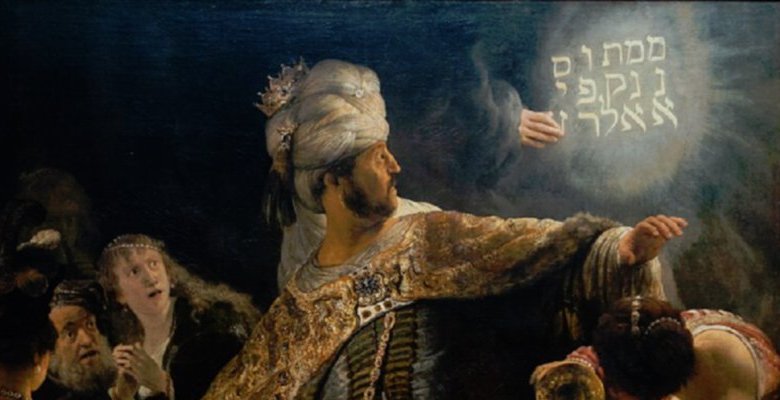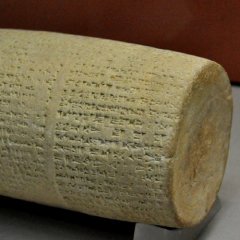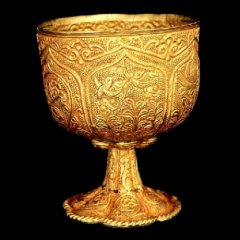BIBLE STUDY HOME

DANIEL — LESSON 6
Scriptures for this lesson are taken from Daniel 5.
As we move into the events of Chapter 5, we need to understand the place and time in history. Some twenty years have passed between chapters 4 and 5. Daniel has been in Babylon close to seventy years. He is about ninety years old and the end of Israel’s seventy years of captivity are coming to an end.
Nebuchadnezzar died in 562 BC. He was succeeded on the throne by his son Evil Marduk. He reigned poorly for two years and was assassinated by his brother-in-law, Neriglisar, who took the throne. He reigned four years. He was succeeded by his son Laborosoardoch, a mere boy who reigned only nine months before he was beaten and killed by his friends. Nabonnidus, took the throne.
After the death of Nebuchadnezzar the Babylonian Empire declined. The succeeding kings were weak and unable to hold the kingdom together. The Medes and Persians had been taking Babylonian territory for several years. By the time of the events in Daniel chapter 5, they had conquered all but the city of Babylon. Nabonnidus has been away from Babylon leading the armies while his son, Belshazzar, ruled in Babylon.
At the beginning of our study I told you that some scholars do not believe that Daniel was a real man and prophet and that this book was written during the period between the Old and New Testaments. One of their reasons is that history never mentioned a king of Babylon called Belshazzar. However, the Nabonnidus Cylinder which has now been found relates the achievements of King Nabonnidus and it also mentions his son Belshazzar.
[Daniel 5:1-4] (1) King Belshazzar gave a great banquet for a thousand of his nobles and drank wine with them. (2) While Belshazzar was drinking his wine, he gave orders to bring in the gold and silver goblets that Nebuchadnezzar his father had taken from the temple in Jerusalem, so that the king and his nobles, his wives and his concubines might drink from them. (3) So they brought in the gold goblets that had been taken from the temple of God in Jerusalem, and the king and his nobles, his wives and his concubines drank from them. (4) As they drank the wine, they praised the gods of gold and silver, of bronze, iron, wood and stone.
The army of the Medes and Persians was outside the city of Babylon and King Belshazzar gives a great banquet for over a thousand people on the inside. All of the noble people in the city are in attendance. Why would the king hold a huge banquet when the army of their enemy was just outside the city trying to get inside? It may have been a show for the people that the king had confidence in the great walls and security of Babylon to keep the enemy out. Ancient historians say that the walls of Babylon were 60 miles around, 15 miles on each side, 300 feet high, 80 feet thick. Because of the work of archaeologists, modern interpreters say that the outer wall was about 17 miles around and 80 to 100 feet tall. There was one-quarter mile of space between the city and the wall. All the way around the wall there were wide, deep moats filled with water and tall towers on the wall for the guards and soldiers. The great Euphrates River divided the city in half. More likely the king was using this large gathering of people to call on their gods for delivery.
Notice they brought out the gold goblets that the Babylonians took from the temple in Jerusalem and drank their wine from them as they praised their gold, silver, bronze, iron, wood and stone gods. In chapter 2 Nebuchadnezzar had a dream of a giant statue made of gold, silver, bronze, iron and iron and clay mixed.
This was a message to Nebuchadnezzar that the God of Israel declared that Babylon would be taken by another nation represented by silver. I believe that King Belshazzar was mocking the God of Israel, using His goblets to praise their gods. Whatever his reason for holding this banquet, it was not a good one.
[Daniel 5:5-9] (5) Suddenly the fingers of a human hand appeared and wrote on the plaster of the wall, near the lamp stand in the royal palace. The king watched the hand as it wrote. (6) His face turned pale and he was so frightened that his legs became weak and his knees were knocking. (7) The king summoned the enchanters, astrologers and diviners. Then he said to these wise men of Babylon, “Whoever reads this writing and tells me what it means will be clothed in purple and have a gold chain placed around his neck, and he will be made the third highest ruler in the kingdom.” (8) Then all the king’s wise men came in, but they could not read the writing or tell the king what it meant. (9) So King Belshazzar became even more terrified and his face grew more pale. His nobles were baffled.
There are a thousand people gathered in this great hall that is 56 feet wide and 170 feet long. This hall has been found and excavated. The wine is flowing and the people are feeling no pain so to speak. Suddenly high on the wall everyone can see a disembodied hand begin to write a message. The people must have been terrified. I would imagine that they panicked and ran to get out of the building. The passage tells us that the king’s face paled, his legs shook and he nearly passed out, he was so frightened. He immediately called for his wise men to come and read the message on the wall. He promised purple robes (a royal position) a gold neck chain and position of third ruler in the land to the person who could read the writing. His father was the first ruler and he was second. When none of his wise men could read the message, the king was even more terrified.
[Daniel 5:10-16] (10) The queen,hearing the voices of the king and his nobles, came into the banquet hall. “May the king live forever!” she said. “Don’t be alarmed! Don’t look so pale! (11) There is a man in your kingdom who has the spirit of the holy gods in him. In the time of your father he was found to have insight and intelligence and wisdom like that of the gods. Your father, King Nebuchadnezzar, appointed him chief of the magicians, enchanters, astrologers and diviners. (12) He did this because Daniel, whom the king called Belshazzar, was found to have a keen mind and knowledge and understanding, and also the ability to interpret dreams, explain riddles and solve difficult problems. Call for Daniel, and he will tell you what the writing means.” (13) So Daniel was brought before the king, and the king said to him, “Are you Daniel, one of the exiles my father the king brought from Judah? (14) I have heard that the spirit of the gods is in you and that you have insight, intelligence and outstanding wisdom. (15) The wise men and enchanters were brought before me to read this writing and tell me what it means, but they could not explain it. (16) Now I have heard that you are able to give interpretations and to solve difficult problems. If you can read this writing and tell me what it means, you will be clothed in purple and have a gold chain placed around your neck, and you will be made the third highest ruler in the kingdom.”
Who is this queen? She was most likely the Queen Mother Nitocris, who was Belshazzar’s grandmother, because she knew about Daniel and the things he had done during Nebuchadnezzar’s reign. She must have been a very old woman by this time. They located Daniel and brought him before King Belshazzar and he offered Daniel the same rewards he had offered his wise men.
[Daniel 5:17-24] (17) Then Daniel answered the king, “You may keep your gifts for yourself and give your rewards to someone else. Nevertheless, I will read the writing for the king and tell him what it means. (18) “Your Majesty, the Most High God gave your father Nebuchadnezzar sovereignty and greatness and glory and splendor. (19) Because of the high position he gave him, all the nations and peoples of every language dreaded and feared him. Those the king wanted to put to death, he put to death; those he wanted to spare, he spared; those he wanted to promote, he promoted; and those he wanted to humble, he humbled. (20) But when his heart became arrogant and hardened with pride, he was deposed from his royal throne and stripped of his glory. (21) He was driven away from people and given the mind of an animal; he lived with the wild donkeys and ate grass like the ox; and his body was drenched with the dew of heaven, until he acknowledged that the Most High God is sovereign over all kingdoms on earth and sets over them anyone he wishes. (22) “But you, Belshazzar, his son, have not humbled yourself, though you knew all this. (23) Instead, you have set yourself up against the Lord of heaven. You had the goblets from his temple brought to you, and you and your nobles, your wives and your concubines drank wine from them. You praised the gods of silver and gold, of bronze, iron, wood and stone, which cannot see or hear or understand. But you did not honor the God who holds in his hand your life and all your ways. (24) Therefore he sent the hand that wrote the inscription.
Daniel faced this king with no fear. He knew that God was always there with him. He let Belshazzar know that he was not interested in his gifts or positions of power. Daniel apparently was moved out of his high position next to the king when Nebuchadnezzar died and had been living in the background of the palace since then. Before he told the king what the writing meant, while he had the king’s full attention, Daniel witnessed to him about the God of Israel who is the most high God, the all-powerful God. He reminded Belshazzar of what happened to King Nebuchadnezzar when he was filled with pride about his accomplishments. God took away all of his power and position and made him live like an animal until he was ready to acknowledge that all he had accomplished was a gift from God and that the God of Israel is sovereign over the kingdoms of men. Belshazzar was filled with pride and had taken the goblets that came from the temple of Israel’s God and drank from them praising the gods of Babylon. Israel’s God had sent the king this message. Also, this is part of God’s plan for the kingdoms of men. The head of gold from Nebuchadnezzar’s dream is going to pass on to the chest and arms of silver which represents the kingdom of the Medes and Persians.
[Daniel 5:25-29] (25) “This is the inscription that was written: mene, mene, tekel, parsin (26) “Here is what these words mean: Mene: God has numbered the days of your reign and brought it to an end. (27) Tekel: You have been weighed on the scales and found wanting. (28) Peres: Your kingdom is divided and given to the Medes and Persians.” (29) Then at Belshazzar’s command, Daniel was clothed in purple, a gold chain was placed around his neck, and he was proclaimed the third highest ruler in the kingdom.
True to his word, Belshazzar makes Daniel 3 ruler in the kingdom. The words mene, teke, parsin mean: numbered, weighed and divided. The number of days left is one. “Tekel” means the Babylonian Kingdom had been evaluated by God and failed. “Parsin” comes from the word “peres” means that the kingdom will be divided and given to the Medes and Persians.
[Daniel 5:30-31] (30) That very night Belshazzar, king of the Babylonians, was slain, (31) and Darius the Mede took over the kingdom, at the age of sixty-two.
While the Babylonians were feasting, Cyrus was working outside the city walls. The Euphrates River divided the City of Babylon in half. The river was inside the outer walls of the city and all along the banks of the river there were great walls on both sides. Across the river between the walls were huge bronze gates that were shut to keep boats from coming into the city on the river. Cyrus had dug channels outside the city to divert the waters of the Euphrates and lower the river going into the city so that his men could walk in water below their waist. When they came to the bronze gates that were across the river, the gates were open and Cyrus’s men marched into the city of Babylon without a fight. They killed King Belshazzar and took the City of Babylon for the first time ever.
Lessons for us from Daniel 5:
1: God will not tolerate idol worship.
2: God will humble us when we continue to take credit for the things He has given us.
3: God is in control of the nations of the world and chooses their leaders according to His will.
4: God’s work will be done according to His timetable.
Lesson 1 • Lesson 2 • Lesson 3 • Lesson 4 • Lesson 5 • Lesson 6 • Lesson 7 • Lesson 8 • Lesson 9 • Lesson 10 • Lesson 11 • Lesson 12 • Lesson 13 • Lesson 14 • Lesson 15 • Lesson 16 • Lesson 17

